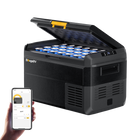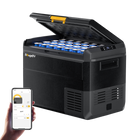How to Calculate the Power Consumption of Your TV When Camping with BougeRV's Solar Panels

Are you planning a camping trip and wondering how to calculate the power consumption of your TV while using BougeRV's solar panels? Don't worry, we've got you covered! In this guide, we will show you step by step how to calculate the power consumption of your TV and other devices to ensure you have enough power to enjoy your trip. With BougeRV's high-quality solar panels, you can enjoy your camping trip without worrying about running out of power. So, let's get started!
As outdoor enthusiasts, we understand the importance of having reliable and sustainable power sources while enjoying the great outdoors. BougeRV's solar panels are designed to provide you with an efficient and eco-friendly power solution, allowing you to stay connected with the world and power your devices wherever your adventures take you. Our aim is to help you make the most of your camping trip while promoting the use of sustainable energy sources.
In this guide, we will provide you with a step-by-step process for calculating the power consumption of your TV and other devices while camping with BougeRV's solar panels. We will also provide you with some helpful tips and recommendations to ensure you have enough power to enjoy your trip.
Understanding Power Consumption

Before we dive into calculating the power consumption of your TV while camping with BougeRV's solar panels, let's first understand what power consumption means.
In simple terms, power consumption refers to the amount of electrical energy a device uses over time. It's measured in units of watts (W) or kilowatts (kW), with one kilowatt equal to 1,000 watts. The power consumption of a device can vary depending on its type, size, and usage.
For example, a small LED light bulb may consume only a few watts of power, while a large refrigerator may consume hundreds of watts. Similarly, a TV can consume anywhere from a few watts to several hundred watts, depending on its size, type, and usage.
To better understand the power consumption of your TV, let's take a look at some common TV types and their typical power consumption:
|
TV Type |
Typical Power Consumption |
|
LED/LCD TV |
30-60 watts |
|
Plasma TV |
200-500 watts |
|
OLED TV |
100-200 watts |
As you can see, different types of TVs consume different amounts of power. LED/LCD TVs are generally the most energy-efficient, while plasma TVs are the least efficient.
It's worth noting that the power consumption of a TV can also vary depending on its size. Generally, larger TVs consume more power than smaller ones. For example, a 32-inch LED/LCD TV may consume around 30-40 watts, while a 55-inch LED/LCD TV may consume around 60-100 watts.
Now that we have a basic understanding of power consumption and the typical power consumption of different TV types and sizes, let's move on to calculating the power consumption of your TV while camping with BougeRV's solar panels.
Calculating TV Power Consumption
Now that you understand the basics of power consumption, let's dive into how to calculate the power consumption of your TV when camping with BougeRV's solar panels. Here are the steps you should follow:
- Check the TV's power rating: The power rating of your TV can usually be found on a label at the back or bottom of the TV, or in the owner's manual. It is usually expressed in watts (W) or amperes (A). Make a note of the power rating.
- Convert the power rating to watts: If the power rating is in amperes (A), you need to multiply it by the voltage (V) to get the power rating in watts (W). In the United States, the voltage is usually 120 V. For example, if the power rating is 2.5 A, the power rating in watts would be 2.5 A x 120 V = 300 W.
- Determine the number of hours you plan to use the TV: Estimate how many hours per day you plan to use the TV during your camping trip. Make a note of this number.
- Calculate the total power consumption: Multiply the power rating of the TV in watts by the number of hours you plan to use it per day. For example, if your TV has a power rating of 300 W and you plan to use it for 4 hours per day, the total power consumption would be 300 W x 4 hours = 1200 Wh.
- Convert the total power consumption to ampere-hours (Ah): Divide the total power consumption in watt-hours (Wh) by the voltage of your battery. For example, if you have a 12 V battery, divide the total power consumption of 1200 Wh by 12 V to get 100 Ah.
By following these steps, you can calculate the power consumption of your TV and determine the appropriate size of the solar panel and battery you need to power it during your camping trip.
Note: Keep in mind that these calculations are estimates and actual power consumption may vary depending on factors such as the type of TV, its settings, and the temperature.
Estimating Solar Panel and Battery Requirements

Now that you have calculated your TV's power consumption and have an idea of how much energy it will require when camping, it's time to determine the appropriate solar panel wattage and battery capacity.
When it comes to solar panel wattage, the general rule of thumb is to match the wattage of the solar panel to the wattage of the device you want to power. In this case, you will need to find a solar panel with a wattage equal to or greater than the total wattage of your TV and any other devices you plan to use.
For example, if your TV requires 100 watts and you plan to use a few small devices that require a total of 50 watts, you will need a solar panel with a wattage of at least 150 watts. However, it's always a good idea to choose a solar panel with a slightly higher wattage than what you think you will need, as this can account for any unexpected power surges or device malfunctions.
In addition to considering the wattage of the solar panel, it's also important to factor in the battery capacity. A battery is necessary to store the energy collected by the solar panel during the day, so that it can be used to power your devices at night or during cloudy weather.
To determine the appropriate battery capacity, you will need to consider how many hours you plan to use your TV each day and how many consecutive cloudy days you may encounter. It's recommended to choose a battery with a capacity that can provide enough power for at least two to three days of cloudy weather.
It's also important to keep in mind that weather conditions can greatly affect the efficiency of solar panels. For example, cloudy or rainy weather can greatly reduce the amount of energy a solar panel can collect. Therefore, it's a good idea to choose a solar panel with a slightly higher wattage than what you think you will need, especially if you plan to camp in an area with unpredictable weather patterns.
To give you an idea of what a solar panel and battery setup might look like based on TV power consumption calculations, here are a few examples:
Example 1:
- TV power consumption: 100 watts
- Additional device power consumption: 50 watts
- Total power consumption: 150 watts
- Solar panel wattage: 200 watts
- Battery capacity: 200Ah
Example 2:
- TV power consumption: 50 watts
- Additional device power consumption: 20 watts
- Total power consumption: 70 watts
- Solar panel wattage: 100 watts
- Battery capacity: 100Ah
Example 3:
- TV power consumption: 200 watts
- Additional device power consumption: 100 watts
- Total power consumption: 300 watts
- Solar panel wattage: 400 watts
- Battery capacity: 400Ah
Keep in mind that these examples are just a starting point and may not be appropriate for every camping situation. It's important to carefully consider your own power needs and adjust your solar panel and battery setup accordingly.
Choosing the Right BougeRV Solar Panel for Your TV

When it comes to powering your TV while camping, BougeRV offers a range of high-quality solar panels that can meet your needs. Here are some factors to consider when choosing the right solar panel for your TV:
Power Consumption: Based on the power consumption calculation from the previous section, determine the appropriate wattage of the solar panel needed to charge your TV's battery. BougeRV's solar panels range in wattage from 100W to 200W, so you can choose the one that best suits your needs.
Portability: Consider how portable you need your solar panel to be. If you're going to be camping in remote locations or need to carry your solar panel with you on long hikes, you might want to consider a smaller, more lightweight option like BougeRV's 100W solar panel.
Compatibility with Other BougeRV Products: If you already have other BougeRV products like a portable power station, consider choosing a solar panel that is compatible with that product. BougeRV offers solar panels with different connector types to ensure compatibility with a range of devices.
Using BougeRV's solar panels for your camping power needs offers several benefits. Not only are they portable and easy to use, but they also come with a 2-year warranty and excellent customer support. Plus, with their high efficiency and reliable performance, you can be confident that your TV will stay powered even in the most remote locations.
Conclusion
In summary, calculating power consumption is crucial when it comes to camping power needs, especially when you plan to power up your TV. By determining the power requirements of your TV and estimating the solar panel wattage and battery capacity needed, you can ensure uninterrupted entertainment during your camping trips.
To calculate your TV's power consumption, you need to identify its wattage and usage time. You can then estimate the solar panel and battery requirements based on your TV's power consumption and other factors, such as weather conditions and portability.
BougeRV's solar panels are an excellent option for camping power needs, as they are designed with features like portability and compatibility with other BougeRV products. We encourage you to check out BougeRV's solar panels for your camping power needs.
For more information and to make a purchase, visit BougeRV's official website at https://www.bougerv.com/.
Remember, with the right solar panel and battery setup, you can enjoy your favorite TV shows and movies while enjoying the great outdoors.

























































































































































































